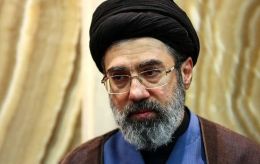Prison instead of Russian passport: How traitor from Zaporizhzhia betrayed Ukraine's military and helped Russians
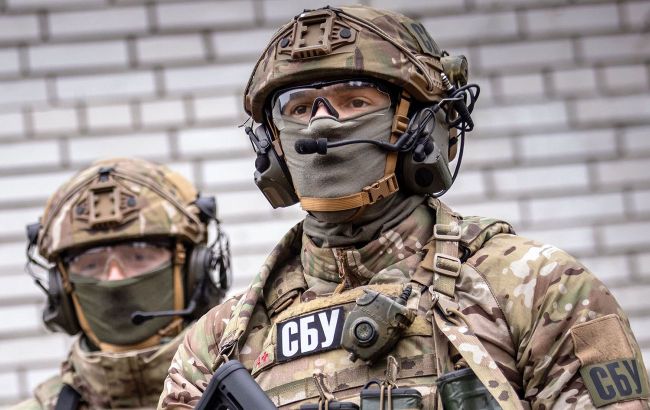 A Security Service officer (photo: SSU Facebook)
A Security Service officer (photo: SSU Facebook)
Over 800 people in Ukraine have been convicted of helping Russians since the beginning of the full-scale Russia's invasion of Ukraine. One of them, a traitor from Zaporizhzhia, is currently in jail and may soon receive his sentence for treason. How people become traitors, what Russia promises for help, and what are their motives - read in the RBC-Ukraine article.
Russia's full-scale war against Ukraine has been going on for almost 3 years now. The Kremlin seems to have already crossed all the lines of humanity, morality, and common sense, not to mention that the goal of the Russian leadership is as transparent as possible. Ukrainian cities are being shelled every day, people are dying from the Russian shelling, and the military is repelling Russian attacks on the frontline every day.
Despite this, there are still people in the country ready to help Russia They aim Russian missiles at military and civilian targets, take pictures of air defense equipment and facilities, and report on the locations of manpower concentration. Two motives mostly drive traitors - either money or ideology. They are regularly caught by the Security Service of Ukraine, and courts hand down prison sentences under the articles “high treason” or “illegal transmission of data about the Armed Forces.”
Since February 24, 2022, the SSU has opened more than 3,100 criminal cases for high treason and more than 580 for passing military coordinates to the Russians and fire adjustments. Almost 800 people have already been convicted under these two articles alone.
One of these traitors is currently sitting in the Zaporizhzhia pre-trial detention center. In 2022, six months after Russia's full-scale invasion of Ukraine he began to cooperate with a Russian agent and pass him the necessary information. With the assistance of the special services, RBC-Ukraine managed to talk to the gunner and find out why he took this step.
***
— If the army of another state enters your territory, what should you do?
— I was there in 2014, I didn't see the army there, I saw Russian volunteers. But I also saw many locals who took up arms.
— What were the Russians doing there?
— This is another issue.
The man, whom we will call Vitalii in this text (for reasons of anonymity - ed.), sits in front of us, putting his leg over his leg, and periodically rustles a file with papers and cigarettes inside. He is a suspect in high treason and was brought to the interview directly from the pre-trial detention center. “He is a complex character. Very cunning. At least he thinks he's very cunning,” the SSU officers describe him.
An hour earlier, Vitalii entered the room prepared for the video recording. We received permission for the interview and the suspect's consent a few days before arriving in Zaporizhzhia, so there should be no mistakes. Vitalii walks in, puts the file with the papers on the table, sits down, and says: “I'm not going to give any interview."
We try to convince him to do a video and get to know each other. Then one of the SSU officers enters the room. “Vitalii, what's the matter? You agreed to do this. Tell people how not to do it, so they don't repeat your mistakes.” Vitalii shrugs his shoulders and cackles: “Maybe I should, but I'm not ready. I don't want to.”
We stay in the room with Vitalii and gradually develop a dialog. After an hour of rather exhausting conversation, we go outside. Vitalii is handcuffed and taken back to the pre-trial detention center, and the SSU officer who was waiting for us at the door smiles. “I told you, he only thinks he's being cunning.”
'Edinomyshlenniki'
A city chat of Zaporizhzhia residents appeared on Telegram a few days after Russia's large-scale invasion of Ukraine. People got to know each other and shared details of what was happening and how to protect themselves. The chat was called "Edinomyshlenniki" (Like-minded in Russian - ed.) and gradually it began to fill up with users. We don't know who they are or where they are from, at least that's what Vitalii tells us.
“I don't want you to film me, but I can tell you my story, and you can tell it as you remember it,” the man tells us, relaxing a bit.
Vitalii immediately denies what he is suspected of. According to his version, he was just chatting in the city chat room The like-minded and did not say anything to anyone. These are Vitalii's first words - “we were just chatting”. Even when we ask him who Misha Kulikov is (name changed for anonymity reasons - ed.), the man's face does not twitch a muscle. “He introduced himself as a resident of Zaporizhzhia or the region, that's all.”
“There was everything, I even made him a bread recipe, he asked for it, and I made it with a video, step by step. I talked to him like an ordinary person, I had no thoughts. That's why I said things to him that I probably shouldn't have...”, Vitalii later says.
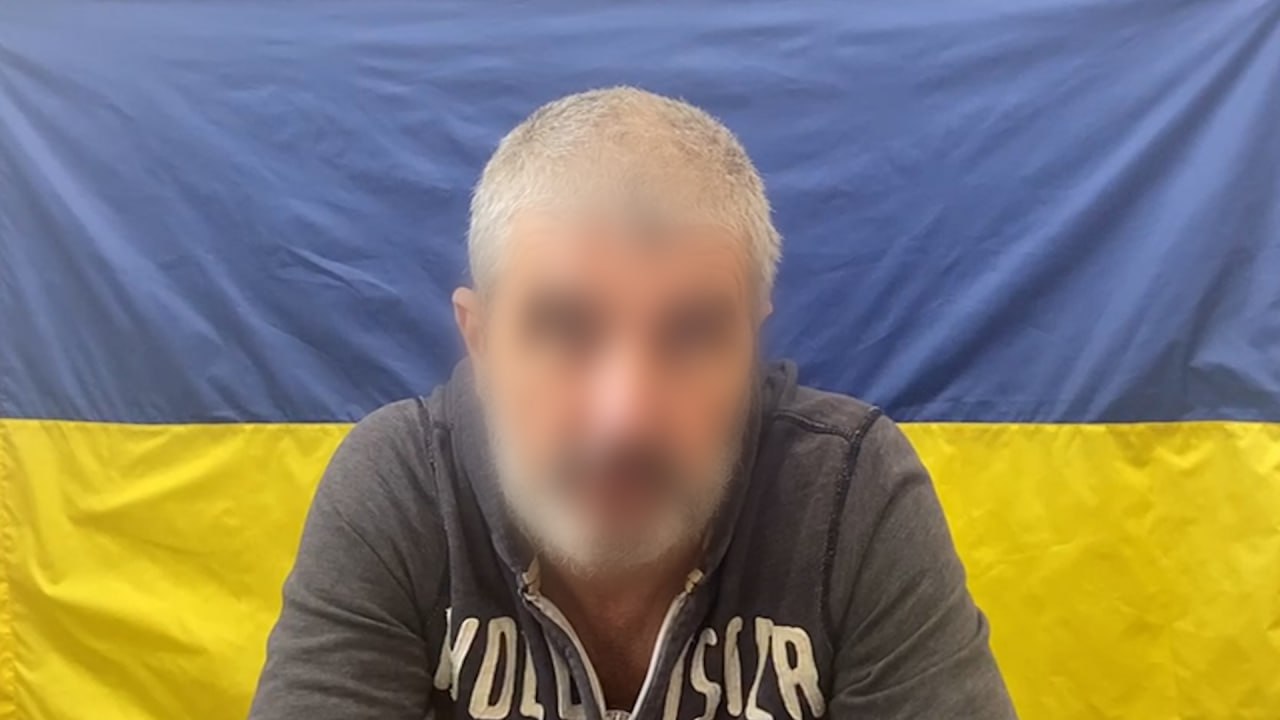 Detained Vitalii (photo: screenshot from RBC-Ukraine video)
Detained Vitalii (photo: screenshot from RBC-Ukraine video)
Things that “probably shouldn't have been said” are the coordinates of Ukrainian military units, the concentration of equipment, and air defense. Especially air defense. The Russians hunt for air defense in a very inventive way. One of them is Mykhailo (or Misha) Kulikov, a member and, as it turns out later, the creator of the chat room The like-minded and, in addition, a representative of the Russian military intelligence.
At first, Vitalii's logic is clear: he loves Ukraine, he hasn't communicated with anyone, he hasn't passed anything to anyone, and there is no doubt about his patriotism. He was born in Donetsk and moved to Kyiv in 2000. Out of his 55 years, he worked in a car service for 35 years. In 2014, he returned to Donetsk to “fix the fences on the graves of his relatives.”
“It was clear to me even then that this war would not end well. It is impossible to resolve a dispute by war if one person chooses one point of view and the other chooses another. I served in Azerbaijan in 87-89, just when all these events in Nagorno-Karabakh and Sumgayit were taking place. I saw people in Lenin Square, the so-called Maidan."
It was around this time that Vitalii began to muddle. His position is strictly yellow and blue at first, but gradually turns into completely different colors. At the same time, the story of the so-called Cossack Kulikov is unfolding. Then the resident suddenly becomes a Russian, and Vitalii, who had previously stated that he did not know the nationality of his interlocutor, suddenly speaks up.
“There were a lot of Russians there (in 'Edinomyshlenniki' chat - ed.). Moreover, when I talked to this guy, I asked him what you were doing, what you were doing when there was a shelling and it came from Kryva Bay and hit the high-rise buildings on the waterfront, I asked him where you were shooting at.”
Vitalii is constantly jumping from topic to topic - from the bread recipe he gave to a Russian intelligence officer to the so-called referendum in Donetsk. The man's attitude is flexible and soft, he is ready to adapt to the mood of the interlocutor. During the interrogation by the SSU, he answered strictly and to the point, here, on the field, where he was allowed to think, Vitalii is reflective. And as a result, he concludes that there is a civil war in Ukraine to some extent.
Vitalii can't figure out what to say and what rhetoric suits him best. At first, he calls Ukrainians Makhnovists (Nestor Makhno was a Ukrainian political and military figure of the 20th century - ed.) because “we are freedom-loving and rebellious.” And if Vladimir Putin had realized this first, he would not have attacked. Then he says that Russians are the same as Ukrainians, and if the army of another state entered their territory, they would become “the whole country.”
— Well, we entered Kursk. And no one stood up as a country.
— Well, that's their business, maybe they think that Kursk is a small part of the country...
In a rather confusing dialog, it was difficult to keep returning to its main subject - the case for which Vitalii is currently in jail. But by the end of the conversation, the man goes from a person who remarks speaking Russian to a man who calls the Ukrainian military “undefeated.” And he mentions this himself. And then there is a confession.
“Invite as many observers as you want from whomever you want, but go ahead and hold the referendums. If many people in Donetsk are in favor, well, I'm sorry. At that time, in 2014, the majority was for Russia. Let's face it - it has always been Russia. We were given these territories as a gift. But it always felt like Russia there.”
Almost nothing remained of Vitalii, who walked into the room, sat down on a chair, and proudly announced that he had no intention of talking. In front of us sat a man who spoke with clichés and Russian propaganda slogans, such as “Russia is a superpower and we need to take its opinion into account.” At one point, it was even funny how trivial Vitalii's logic was. At the same time, he continued to give out template formulations and whataboutism (a technique in speech when, not wanting to talk about the topic, a person asks a question about an extraneous subject, starting with the phrase “What about...” - ed.)
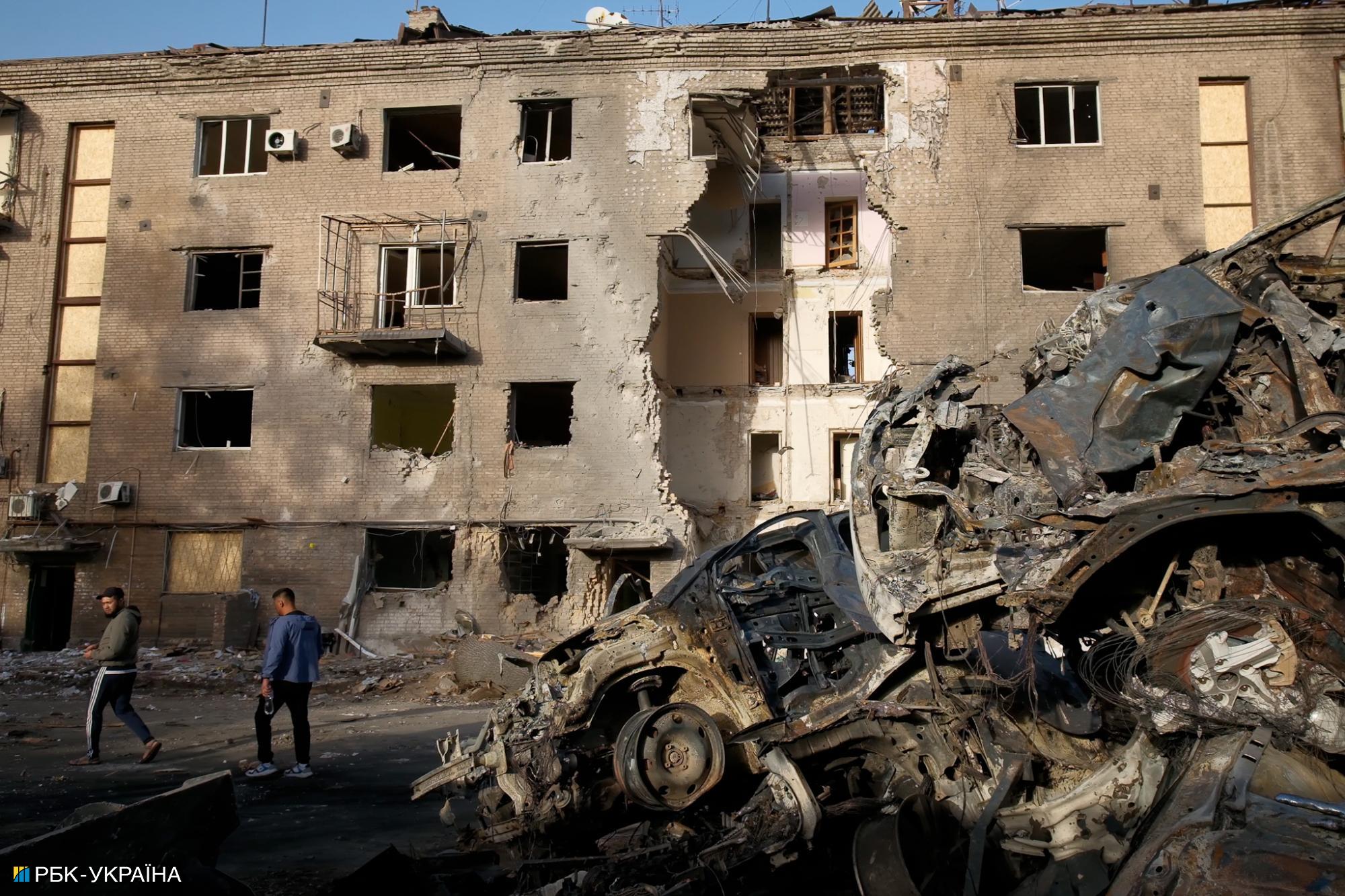 A house destroyed by a Russian missile in Zaporizhzhia (photo: Vitalii Nosach/RBC-Ukraine)
A house destroyed by a Russian missile in Zaporizhzhia (photo: Vitalii Nosach/RBC-Ukraine)
— Doesn't Russia have the right to dictate what we should do? Yes, it does.
— Well, America doesn't have the right to dictate to Afghanistan, does it?
— We are now talking about the example of Ukraine and Russia.
— Russia considers itself a superpower, and it is. You can't get away from that. This is the political picture of the world that emerged after the Second World War, and so far nothing has changed. I understand that the West has always dreamed of splitting it up and reducing it, but this will not happen for now. And this must be taken into account.
At the same time, the man does not forget to emphasize all the time that even if he said something to Misha Kulikov, it was a mistake, he said, he did not want to frame anyone. He continues to love Ukraine and hate Russians. Judging by the article under which Vitalii is charged, he faces 15 years in prison. Trying to summarize the conversation, we ask him what he thinks about it. Since the man has confessed to what he did but denies his motivation, the answer is quite predictable.
— You have to take responsibility for everything you do. Even for being stupid. You just have to answer in different ways.
— How many years would you give yourself?
— I would not give myself anything, I immediately said in court - if possible, put me in an electronic tag, give me tools and a garage. I'll work it off quickly.
At the Security Service of Ukraine
The first message from Vitalii to the Russian military, according to information obtained from his phone, was sent on October 9, 2022. “A bunch of boats has surfaced from ***, I don't know if they are loaded, it's dark, there are several slow-moving ones, the project “***”, you can hardly hear them when they are sailing.”
Another one is from October 11. It said that the Ukrainian Armed Forces had deployed a battery in one of the settlements, followed by a map with the location marked on it. The message about the “unconquered Armed Forces of Ukraine”, as mentioned by Vitalii himself, was sent on October 15. In his attempts to justify himself, the man told us that he was referring to the Azov regiment's soldiers “with swastikas” which evoked in him a feeling of hatred for the German invaders of World War II. The message looked like this:
“By the way, early in the morning there was a result all from ***, a girl saleswoman lives in ***, she was going to work and watched, with a fully 'equipped', with backpacks behind her back and bags in her hands, I think these are residents of the former base ***, who ate in *** and for some reason did not finish, but now they have left in an unknown direction according to her description at least ***”.
There were several other messages, the content of which is generally similar - coordinates, targeting, and attempts to count how many vehicles the Armed Forces of Ukraine has. Only the last message differs - in it, Vitalii admits that he is worried: “That's all right, by the way, the boats are back in ***, and their personnel didn't suffer much there, they scared more civilians, I don't know who shot, but it's no use, think about the chat, I'm worried."
The tone and the content of the messages themselves leave no room for excuses or, as in the case of Vitalii's rhetoric, attempts to make a fool of himself. The man understood perfectly well what he was doing and why. The same is said by one of the Security Service of Ukraine operatives who were working on this case.
“The man moved around Zaporizhzhia, looking for and looking at places where air defense systems were located. He filmed, and he was shown places, perhaps the locations of these units, vehicles, or air defense systems themselves. And under various pretexts, legends, he visited these places and passed this information to Russia.”
Moreover, during the interrogation by the SSU, Vitalii himself said why and to what benefit he was performing Russia's tasks.
— Were you promised anything for this?
— For helping them? The only thing they said was that I would be able to leave Ukraine.
— Do you feel bad in Ukraine?
— No, I had personal issues.
This issue was the lack of a Ukrainian passport. As it turned out, Vitalii has not had a document that identifies him as a citizen of the Ukrainian state since 1991. In a conversation with us, he talked about this himself and even complained, saying that he tried to get a passport but failed, was denied everywhere, and was told to take a bribe. We can only guess how the man has lived in the country for more than 30 years, allegedly without documents.
“He is a scammer. We found out that he was living with forged documents and was engaged in fraud. His motives are not so much ideological as material,” says the SSU officer.
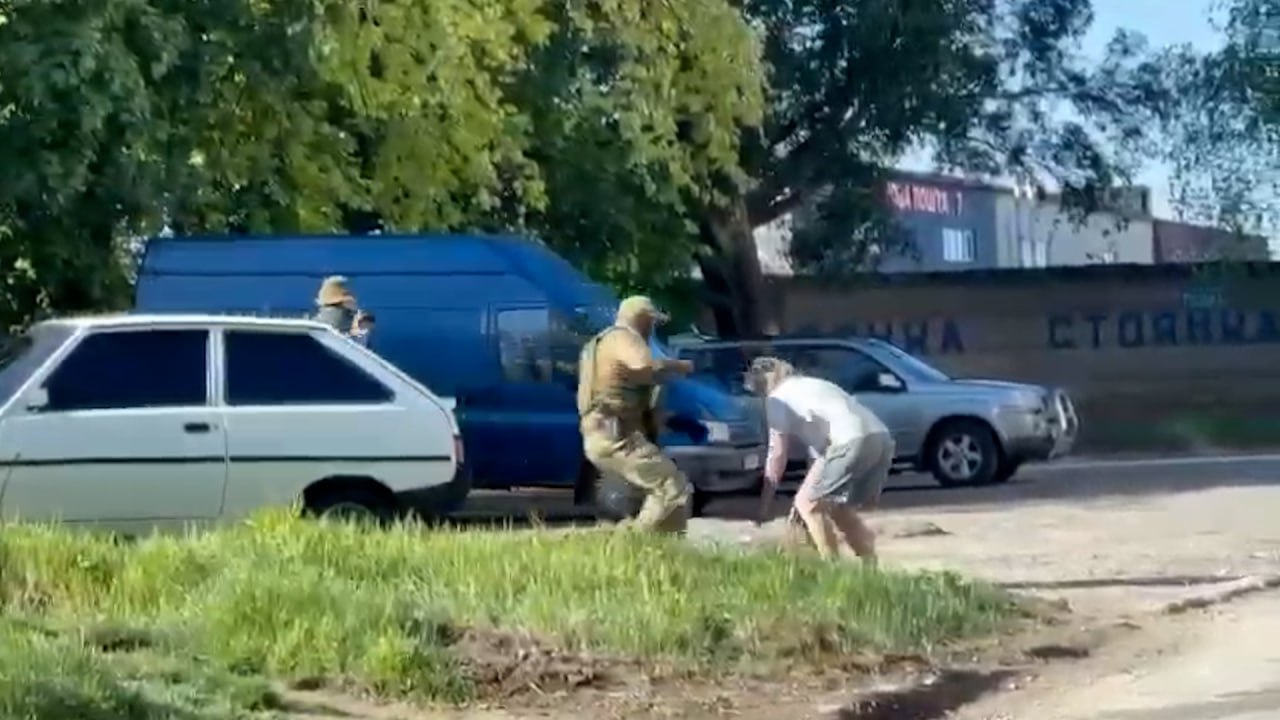 Vitalii's detention (photo: screenshot from the RBC-Ukraine video)
Vitalii's detention (photo: screenshot from the RBC-Ukraine video)
Vitalii was detained in the summer. In the video, he is walking down the street and, hearing a shout: “The SSU is working!” he submissively lies down on the ground. On those days, when the traitor was sending coordinates to the Russian representative, the town where he lived was shelled. From October 8 to 9, the Russian army hit a multi-story building with a rocket, killing 17 people.
It is difficult to understand any person who supports the aggressor. It is even harder to understand a citizen of a country who supports the aggressor who attacked them. Unfortunately, Vitalii is not the only example. Traitors, collaborators, and gauleiters are caught regularly. Some are driven by the desire to make money, others by ideological motives. It is difficult to say which of these two options is more surprising.



